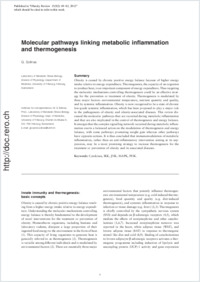Molecular pathways linking metabolic inflammation and thermogenesis
- Solinas, Giovanni Laboratory of Metabolic Stress Biology, Division of Physiology, Dept. of Medicine, University of Fribourg, Switzerland
-
29.10.2012
Published in:
- Obesity Review. - 2012, vol. 13, no. S2, p. 69–82
English
Obesity is caused by chronic positive energy balance because of higher energy intake relative to energy expenditure. Thermogenesis, the capacity of an organism to produce heat, is an important component of energy expenditure. Thus targeting the molecular mechanisms controlling thermogenesis could be an effective strategy for the prevention or treatment of obesity. Thermogenesis is modulated by three major factors: environmental temperature, nutrient quantity and quality, and by systemic inflammation. Obesity is now recognized to be a state of chronic low-grade systemic inflammation, which has been proposed to play a major role in the pathogenesis of obesity and obesity-associated diseases. This review discussed the molecular pathways that are recruited during metabolic inflammation and that are also implicated in the control of thermogenesis and energy balance. It emerges that the complex signalling network recruited during metabolic inflammation exerts a balanced action on the modulation of thermogenesis and energy balance, with some pathways promoting weight gain whereas other pathways have opposite actions. It is thus concluded that immunomodulation of metabolic inflammation, rather than an anti-inflammatory intervention aiming at its suppression, may be a more promising strategy to increase thermogenesis for the treatment or prevention of obesity and its associated diseases.
- Faculty
- Faculté des sciences et de médecine
- Department
- Département de Médecine
- Language
-
- English
- Classification
- Biological sciences
- License
-
License undefined
- Identifiers
-
- RERO DOC 31057
- DOI 10.1111/j.1467-789X.2012.01047.x
- Persistent URL
- https://folia.unifr.ch/unifr/documents/302655
Statistics
Document views: 139
File downloads:
- pdf: 263
